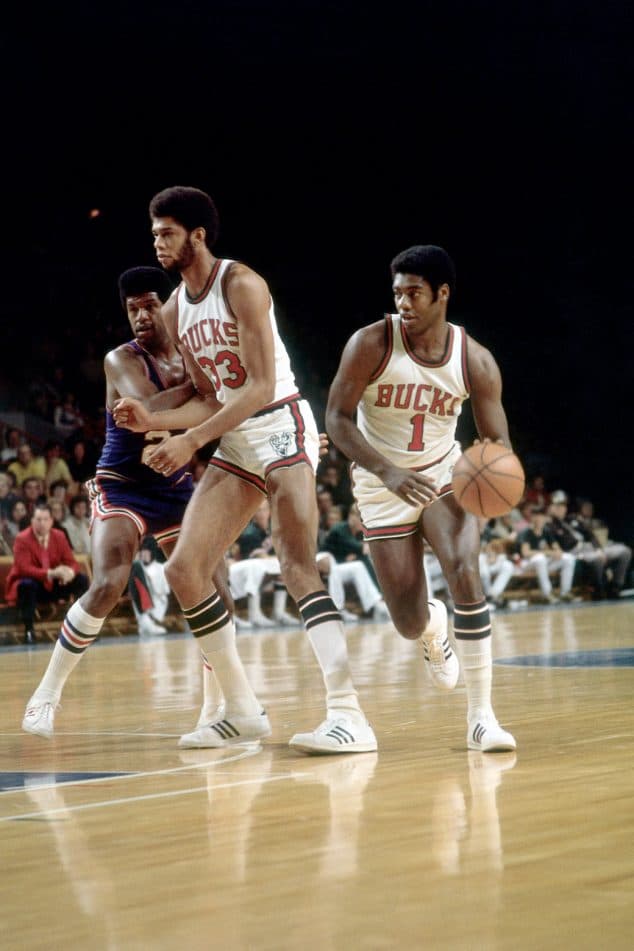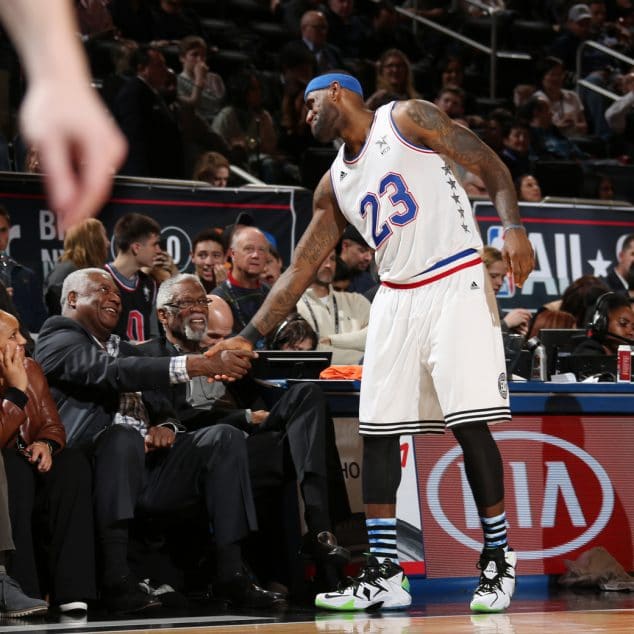All of Barker Hangar in Santa Monica, California commended Oscar Robertson with a standing ovation as he prepared to accept a Lifetime Achievement honor during the 2018 NBA Award Show last June.
The award, fittingly presented by Kareem Abdul-Jabbar and Charles Barkley, was only the second of its kind. (Bill Russell was the inaugural recipient at the first award show a year prior.)
The Big O was greeted with a video package, featuring past and present NBA stars, commemorating his importance on and off the court.
“His contribution to the NBA I don’t think will ever fully be appreciated,” said fellow Hall of Famer Jerry West.
“I’m not even close to the things Oscar was able to do,” added Russell Westbrook, who was the first NBA player since Robertson (in 1961-62) to average a triple-double for a full season.
“Much of who I am today is shaped by basketball, but my story is much more than just basketball,” said Robertson, now 80-years-old, during his acceptance speech.
“Sometimes in life, it is important to be persistent, or as I’ve been called, ‘stubborn.’ Stubborn about what you believe in in order to help others, even at great personal sacrifice.”
In 1955, Robertson led Indiana-based Crispus Attucks to the first ever high school state basketball championship won by an all-black school in the United States—a feat repeated the following year.
At the time, the winning team traditionally rode on a fire truck to a celebration in Monument Circle, which is how Milan High—the team that inspired the 1986 film Hoosiers—was honored in 1954. But with Crispus Attucks, the first visit to and past the famed Circle was very brief, as players were not allowed to get off the truck and were quickly redirected to Northwestern Park. In 1956, Robertson didn’t even make the trip, and went home after claiming a landmark second consecutive state title to complete a legendary high school career.
“Since we were black, they decided we were going to tear up the town and they took us to an all-black community center,” Robertson said.
The 6-foot-5 Robertson later became one of the greatest college basketball players ever, leading to his No. 1 overall selection in the 1960 NBA Draft by the Cincinnati Royals. While at the University of Cincinnati in the late 1950s, the racism continued, as Robertson had to stay in college dorms on road trips while his teammates were placed in hotels.
He won his first NBA title in 1971 with Kareem Abdul-Jabbar and the Milwaukee Bucks, and from 1965 until his retirement in 1974, Robertson was the president of the National Basketball Players Association, only the third to ever hold the prestigious position.

In 1970, before becoming a champion, Robertson helped break ground by filing a class action lawsuit against the League, halting a potential NBA/ABA merger to shed light on how conditions for players could improve. Impediments included binding a player to one team for his entire career (the option or reserve clause) and problems surrounding the NBA Draft system.
The sides settled in 1976, in what is now known as the Oscar Robertson Rule, where the NBA agreed to eliminate the reserve clause. It planted the seed to where today’s leaders like LeBron James, Kevin Durant and others have recognized their power and exercised it in a way that is revolutionary across professional sports, especially one as minority-driven as basketball. The move also affected off-season transactions in other sports.
Robertson fought so those after him wouldn’t have to. (Or at least not as rigorously, because there’s always a fight to be had.)
“As president of the Players Association, I had the opportunity to push for free agency and to improve working conditions,” Robertson said in the latter portion of his acceptance speech. “And I along with several others followed what we believed in, and what we thought was the right thing to do. So that little kid, who just wanted to play in the dust bowl back in Indianapolis, ended up testifying before a U.S. senate subcommittee on behalf of all the players … winning that battle is every bit as rewarding to me as anything I ever achieved on the basketball court.”
So we have Robertson to thank for festive NBA summers, where player signings cause the basketball world to stop all activities and conjoin on social media. The power of the players begins with The Big O.

And of course, Robertson’s greatness between the lines rivals anyone else who has ever worn an NBA uniform.
Robertson continues to encourage players to fight. Last June, he made headlines for suggesting that the only proper way for players to make progress toward equality on black issues was for their white counterparts to join the battle.
“But the only thing that really bothers me is, ‘Where are the white athletes when this is happening?’” he asked backstage of the award show, as reported by the Chicago Tribune. “This is not a black athlete problem. You see injustice in the world. It’s all around you.
“But it seems that what we have today is a system where you don’t want players to say anything at all,” he added. “Because years ago they didn’t say anything because they couldn’t say anything. But now I hope they all, the whites and the blacks get together.”
When the cause is bigger than you, the fight will always continue. Robertson recognized that nearly 50 years ago—and perhaps long before that—and more of our great athletes today have a meaningful voice as a result.
—
Bryan Fonseca is a contributor to SLAM. Follow him on Twitter @BryanFonsecaNY.
Photos via Getty.